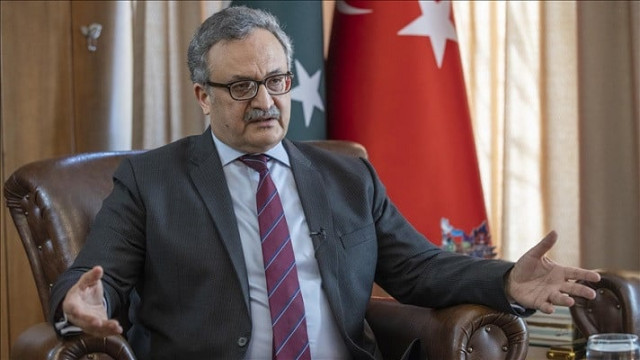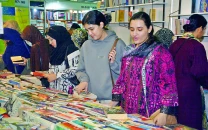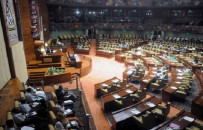‘Fair’ polls exemplify democratic tradition, Qazi tells UN body
Foreign secy says millions freely exercised their fundamental right to vote

Pakistan’s ongoing peaceful transition of power following the Feb 8 “fair” election demonstrated the strength of the country’s democratic tradition and values, Foreign Secretary Syrus Sajjad Qazi said.
“Tens of millions of Pakistani citizens freely exercised their fundamental right to vote,” Qazi told the high-level segment of the United Nations Human Rights Council’s 55th session which began in Geneva on Monday.
Pakistan, he said, was a staunch supporter in promoting universal respect for human rights, and remains a strong voice for protection, and indivisibility of all human rights.
“We have always endeavoured to foster dialogue, mutual understanding, and consensus at the Council,” the foreign secretary added.
Pakistan, he said, had also contributed to the 47-member council’s work in areas of social and economic rights; religious intolerance; disinformation; rights of children, older persons and persons with disabilities; and the frontier issue of emerging technologies.
Despite many exogenous challenges, the foreign secretary said, “Our investment in strengthening social safety nets and improving standards of education and health continue.” An independent media and a strong civil society enrich Pakistan’s human rights discourse domestically, he added.
“A few weeks ago, despite serious threat of foreign sponsored terrorism, Pakistan successfully held a peaceful and fair election. The peaceful transition of power, which is under way, demonstrates the strength of our democratic tradition and values which are essential to the enjoyment of civil and political rights,” he told delegates.
“At the same time, we are cognisant that promotion of human rights is a journey, which we are fully committed to pursue for progress and prosperity of our people,” he added.
In his remarks, the foreign secretary reiterated Pakistan’s demand that the council establish a Commission of Inquiry into the Indian occupation forces’ human rights abuses and atrocities in Kashmir, and also an unconditional ceasefire in Gaza.
In Indian Illegally Occupied Jammu and Kashmir (IIOJK), he said, “India’s settler colonial project continues in full swing in breach of UN Charter, Security Council resolutions and international law.”
Pointing out that rubber-stamping by the Indian Supreme Court in December of India’s unlawful actions of August 5, 2019 was a serious travesty of justice, Qazi said that political and demographic engineering of the occupied territory was being carried out by the world’s self-professed largest democracy through an outsized military presence and draconian laws.
“In doing so, India continues to systematically violate every single basic human right of Kashmiri people,” he said, referring to arbitrary arrests, torture, summary executions, confiscation of properties, destruction of homes and excessive surveillance that had been inflicted upon the brave Kashmiris.
“Freedom of assembly, expression, and religion has been outlawed; and political parties banned.
Kashmiri political leaders, journalists and human rights activists remain incarcerated, and some face death penalties under fabricated cases. Kashmiri women and children suffer several layers of institutionalised discrimination, abuse and violence,” Qazi said.
“We urge the Council to act on the recommendations of the earlier two Kashmir reports and establish a Commission of Inquiry,” he added.
“We also ask India to grant unhindered access to global media, civil society groups, and UN human rights mechanisms to the occupied territory.”
APP



















COMMENTS
Comments are moderated and generally will be posted if they are on-topic and not abusive.
For more information, please see our Comments FAQ